Healthy Mouth, Healthy Body
Taking good care of your teeth and gums isn't just about preventing cavities or bad breath.
The mouth is a window into the health of the body. It can show if you are not eating foods that are best for you or if you may be at risk for a disease. Diseases that affect the entire body (such as diabetes) may be noticed because of mouth sores or other oral problems.
The mouth is filled with many bacteria. Some of these bacteria are linked to tooth decay and periodontal (perry-oh-DON-tal, or gum) disease. Periodontal disease may be connected with diabetes, heart disease and stroke. The exact connection is not yet known.
Periodontal Disease: What You Should Know
Periodontal disease is an ongoing inflammation caused by bacteria that live in plaque. Plaque is the sticky, colorless film that forms constantly on the teeth and tissues in the mouth. The bacteria in plaque irritate the gums, making them red, tender and likely to bleed. This condition is called gingivitis (jin-ja-VY-tis), and it can lead to more serious types of periodontal disease.
Gingivitis can be reversed if you remove plaque before it builds up. You can do this by brushing twice a day, flossing daily and having your teeth cleaned regularly in the dental office.
If you do not get rid of gingivitis, it can turn into periodontitis (perry-o-don-TIE-tis), an infection in the spaces between the teeth and gums and around the teeth. Periodontitis is usually not painful. Even so, it can damage the attachment of the gums and bone to the teeth. It can even lead to bone loss. If the disease is not treated at this stage, your teeth may become loose, fall out or require removal by a dentist.
If you notice any of these signs, see your dentist:
- gums that bleed during brushing and flossing
- red, swollen or tender gums
- gums that have pulled away from your teeth
- bad breath that doesn’t go away
- pus between your teeth and gums
- loose or separating teeth
- a change in the way your teeth fit together when you bite
- a change in the fit of partial dentures
The Mouth-Body Connection
Diseases like diabetes, blood cell disorders, HIV infections and AIDS lower the body's resistance to infection. This can make periodontal diseases more common and more severe. Ongoing inflammation from periodontitis is linked with heart disease, blocked arteries and stroke.
People with diabetes commonly have periodontal disease. And they are more likely to develop and have more severe periodontitis than are nondiabetics.
Although periodontitis may relate to these health concerns, this does not mean that one condition causes the other. But it is known that diabetics and smokers are at higher risk of developing periodontal diseases. Researchers are still looking at what happens when periodontitis is treated in patients with these health problems.
Effects of Periodontal Disease
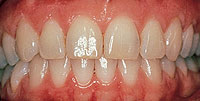
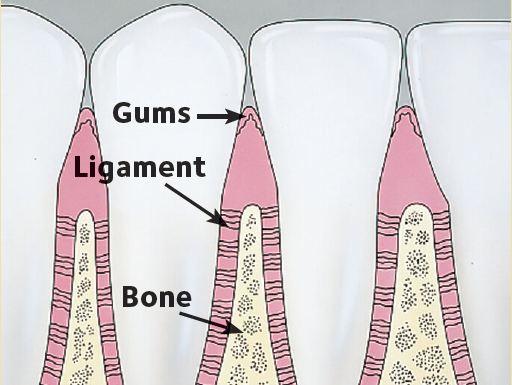
Healthy gums and bone hold teeth firmly in place.
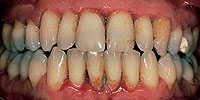
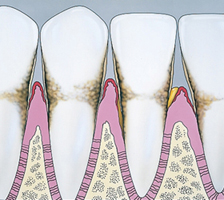
Periodontitis happens over time, as plaque and tartar (calculus) build up along the gumline. Bacteria in the plaque begin to break down the connection between the supporting soft tissues and the tooth. As the disease progresses, it attacks the bone tissue as well.
What You Can Do
Keeping your teeth and gums healthy is very important.
Brush your teeth well twice a day. In addition, you should floss or use another between-the-teeth cleaner once a day. Consider also using an antimicrobial (germ-fighting) mouthrinse every day.
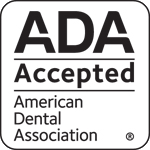 Choose dental products that have the American Dental Association Seal of Acceptance. The ADA Seal tells you that the product is not only safe, but it also does what it says it does.
Choose dental products that have the American Dental Association Seal of Acceptance. The ADA Seal tells you that the product is not only safe, but it also does what it says it does.Schedule regular dental visits. Professional cleanings are the only way to remove tartar (or calculus), which traps plaque bacteria along or below the gumline.
Tell your dentist about changes in your overall health, like any recent illnesses or ongoing conditions. Provide an updated health history including medication use—both prescription and over-the-counter products.
Don't smoke or chew tobacco. If you use tobacco, talk with your dentist about options for quitting.
Manage dry mouth. Too little saliva in the mouth can lead to tooth decay and gum disease. Many medicines cause dry mouth. If you think you may have dry mouth, talk with your dentist about ways to manage it.
![]()
Patient education content ©2014 American Dental Association. All rights reserved. “ADA” and the “ADA” Logo are registered trademarks of the American Dental Association.
Contact Us
Shiva G. Rad, D.D.S. is located at 3055 Plymouth Rd Suite 100 Ann Arbor, MI 48105.




